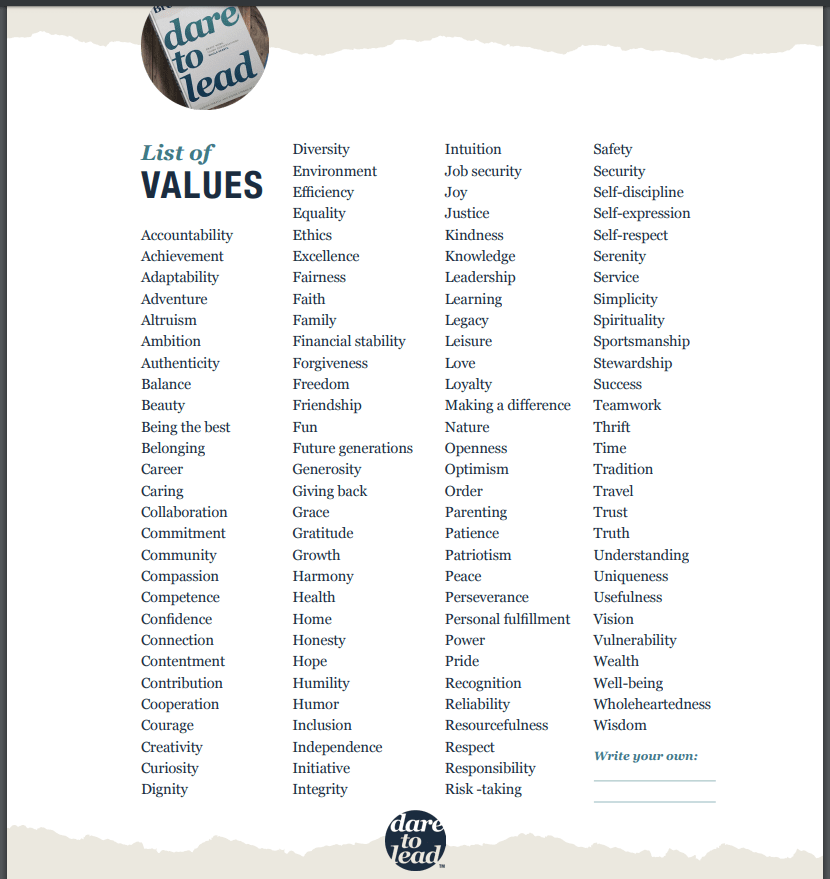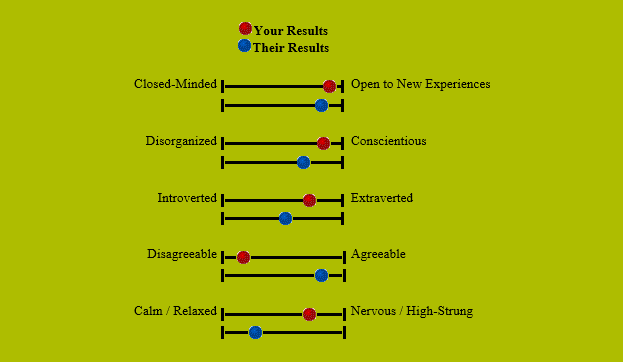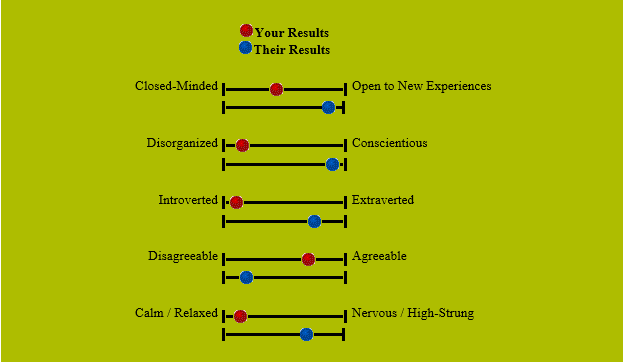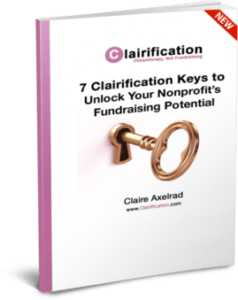 These are the best of times. These are the worst of times.
These are the best of times. These are the worst of times.
However you see the present, rest assured others see it the opposite.
How do you cope? How do you help others cope? How are you adapting, personally and professionally, to the times in which we live?
It turns out the way you cope, particularly during times of stress, has a lot to do with your unique personality traits.
During such times, it pays to be self-aware. It can help you understand why you may be feeling particularly panicky. Or inexplicably calm and at peace. ANd it can help you lean in to what makes you feel creative, purposeful, and even joyful.
Through self discovery, you can live your life in the best way possible.
Want to make a contribution that feels authentic, productive and true to you? Want to make this a year where you help others do the same, be they your family, friends, co-workers, program participants and beneficiaries, volunteers or donors?
Then how about taking a bit of focused time to unearth some important truths about the most interesting person on earth — YOU!
Now is a terrific time for some good old-fashioned introspection.
Turn off the news, stop scrolling through social media, and instead get in touch with, and appreciate, what you bring to the table.
How to Learn About the Most Interesting Person on Earth
I’ve got four fun things for you to try!
One is a values exercise. The others can be grouped under the mantle of “personality tests.”
First, let’s stipulate values vary and they’re all legitimate. Also, there’s no ‘right’ or ‘wrong’ personality. These exercises and assessments I’m sharing today are my favorites for the workplace (and beyond) as they’ve been rigorously tested, are grounded in research and have been shown to be fair and consistent across populations. Plus, they’re fun to take.
Are you game?
Even if you don’t love doing exercises and taking quizzes as much as I do, you may find one or more of these interesting. None of them take a lot of your time. And it’s even more fun if you do it together (with friends, family, co-workers); then compare and discuss results!
Remember: Everyone brings their own gifts to the situation at hand.
1. Clarify Your Values Exercise
During tough times, values can become like faith; an almost spiritual practice – if we practice them. We talk a lot in nonprofit circles about organizational values and culture, but what about your core individual values? We all have them, yet we don’t take much time to think about them. Or consider how we might actually live them. It’s important, because in many ways these are the things that nourish you. Consider them not just values, but core nutrients.
Everyone’s values/core nutrients are different. Do you know yours?
Option 1: Values Identification
Brene Brown has a great list of values you can use to get started.
 Circle the values that most speak to you. Maybe pick 5 of them. You don’t have to share the same values as everyone else. And you don’t have to choose the ones you think you should choose.
Circle the values that most speak to you. Maybe pick 5 of them. You don’t have to share the same values as everyone else. And you don’t have to choose the ones you think you should choose.
Are you honoring those you circled? Might you be happier if you were? How might you re-orient your life around expressing those values you hold most dear?
PERSONAL EXAMPLE: I know my top value is honesty. Kindness is also up there, but honesty sometimes gets in the way of that. So I have to be more aware than I sometimes am. Achievement is up there as well, which really helps me to get things done. But sometimes that can be pretty unrelaxing so, again, I need to be aware and strive for more balance.
Option 2: Peak Experiences
Another way to identify your values is to consider several peak experiences from your life.
Don’t get fixated on what you believe are supposed to be peak experiences. Look for what brought you a true sense of fulfillment and alignment with self. It could be a conversation with a friend. Or a visit to an art museum or natural area. Or a wedding, divorce or birth of a child. Or cooking a meal for a loved one. Or planting in the garden. Once you have your peak experiences, write down what it was about it that made it personally fulfilling. (e.g., being creative; being connected with the earth; nurturing; living my truth; achieving my goal; being vulnerable; taking a risk; overcoming fear; being curious; choosing my battle, collaborating with a team, being playful, etc.).
From here, you can identify 3 – 5 core values being expressed. Not only do you have these values; you also enjoy living these values. Core values can become your prescription for a fulfilling life. It’s a great exercise to ground you as you go through times that feel chaotic and out of control. Measure your work, and success, around how fully you’re living your core values. Lead with those to navigate stressful periods.
NOTE: You may find it’s challenging to live your values in changed circumstances. That’s okay. Consider new ways you could live your values, or ways you might even live your values more boldly or with greater meaning and depth. For example, if community and connection are an important value for you, what new ways might you connect today? If making a difference is a core value of yours, what ways can you innovate to make a difference today?
You may find what you most value now is not what you most valued yesterday. That’s okay too. You are free to choose your values. And consider how you might live these values under any new environment in which you find yourself. And don’t beat yourself up if you don’t succeed every day.
2. Assess Your Personality
The Big Five Project Personality Test is a terrific way to get in touch with your own way of approaching the world – during the best and worst of times. The test measures what psychologists deem to be the five fundamental dimensions of personality. What’s extra fun about this test is they allow you to rate yourself and one other person simultaneously. Then you can have them do the same. I did this with my husband, but you can easily do this with a co-worker as well. We had an interesting discussion afterwards about where we agreed, differed and why. Here are my ratings for the two of us (top) and his ratings (bottom), so you can see the scales they measure (TMI?).


Let’s just say we know each other pretty well. He finds me every bit as disagreeable as I find myself (let’s just stipulate that’s what makes me a good coach and consultant; I’ll give it to you straight so you’ll always know what will work/what won’t). I rated him as more organized than he did (you see, I always tell the truth; one truth is he’s too hard on himself). And we both agree which one of us is keeping the other calm!
EXAMPLE: Need an example about how these “Big 5” may play out in real life? The good folks at The Agitator-Donor Voice wrote a terrific article about how these aspects of your personality might pre-dispose you to cope in a pandemic.
3. Assess Your Strengths
The Gallup/Clifton Strengths Finder is my ‘go to’ when working with individual coaching clients. I’ve used it with teams in work settings as well. It’s a robust tool that’s been used in thousands of workplaces – for-profit and non-profit – worldwide. I’ve found it to be reliable, and a great springboard for figuring out what you most enjoy doing. This helps you do more of that, and less of what you’re not good at.
Here’s the deal: The standard way of evaluating employees, sadly, is to hone in on their weaknesses and ask them to improve in those areas. This tool takes a different approach: What if we honed in on strengths, asked people to do more of the things that play to their strengths, and removed from their plates those things that fall within their area of weakness? There’s likely someone else on your team who carries your weakness as a strength, and who might welcome the tasks you never get around to. This makes everybody happier; the organization as a whole becomes stronger, and you all become more aware of each other’s unique gifts.
Plus… if you take the test, you’ll get a valuable snapshot of the strengths you most enjoy playing to. It’s great to seek out opportunities to use these strengths more. In an interview situation, for example, I always recommend talking about these strengths – no matter what question is asked of you! Let’s say “achiever’ is one of your strengths. The interviewer asks: “How is your attention to detail?” Instead of saying “great,” what about saying: “I’m often described as an achiever. I’ll achieve whatever task is set before me. May I tell you about a recent achievement about which I’m quite proud?”
ACTION: Full disclosure, this assessment does take an hour of your time. As of this writing, it costs $24.99 to take the basic test online. It’s worth both the time and investment.
4. Discover Your Creative Type
One of the survival skills for the disruptive times we’re in is innovation. This Creative Types assessment from Adobe helps you discover your innovation style. Once you get your results (this takes about five minutes) you can download and/or share with others. The visuals when you take this are awesome! I found out I’m ‘The Visionary’ and my ideal collaborator is ‘The Thinker.’ Here’s what it said (I promise, whatever your result is it will make you feel good):
Emotional, passion-driven, and full of ideas, the VISIONARY combines a vivid imagination with a desire for practical solutions. Your introspective and intuitive nature is balanced by a keen interest in the world around you and a desire to contribute to society. You love sharing your ideas and visions with others and creating community around shared values and ideals. Your greatest gift? The ability to see the spark of potential in everything and everyone, and to inspire others to see it, too. You’re able to guide people toward an invisible horizon with a rare generosity of spirit and strength of conviction.
I confess this feels pretty spot-on to me, as I founded Clairification precisely to share ideas and visions around shared values. And folks have told me more than once I’ve a unique combination of vision and pragmatism. In fact, it’s what I try to include in all my articles – a dose of why and where we’re going, balanced by some practical steps of what it takes to get there. I hope I succeed. [Though I hope I don’t really have five eyes; unless I could move a couple to the back of my head!)
 Closing Thoughts
Closing Thoughts
The times we’re in are extraordinary, and having strong coping skills today are truly important.
Whether you’re a fan of assessments like these or not, taking a little time for self- reflection is always a good thing. It’s pretty much essential during times of crisis, so it’s best to be prepared. Otherwise, you’re likely to default into one of the less effective fight/flight/freeze coping modes (really intended for dealing with physical, not emotional, survival).
When in uncharted territory, it’s important you find your own true north. It helps to have a guide, whether it be a mentor, coach or some sort of tool like the ones I’ve suggested here.
Live your values, use your strengths, give yourself some grace, and discover the ways you’re best wired to innovate, create, and help others live their best lives possible.
7 CLAIRIFICATION KEYS TO UNLOCK YOUR NONPROFIT’S FUNDRAISING POTENTIAL
 This 42-page e-guide includes a wealth of materials to help you take some time to develop the necessary mindset, and supporting infrastructure, to show donor-investors what’s in it for them to affiliate with you. What value do you offer? And why is it better than what anyone else is offering? Grab this series of clairifying worksheets, individual and group exercises, templates, checklists and more. You’ll learn to be genuinely thoughtful about your goals and objectives — something needed today more than ever.
This 42-page e-guide includes a wealth of materials to help you take some time to develop the necessary mindset, and supporting infrastructure, to show donor-investors what’s in it for them to affiliate with you. What value do you offer? And why is it better than what anyone else is offering? Grab this series of clairifying worksheets, individual and group exercises, templates, checklists and more. You’ll learn to be genuinely thoughtful about your goals and objectives — something needed today more than ever.
As with all Clairification products, this comes with a 30-day, no-questions-asked, 100% refund guarantee. There’s no way you can lose. If you’re not happy, I’m not happy.
Please let me know in the comments below if you find any of these tools or exercises helpful.
Image courtesy of John Hain from Pixabay






Thanks, Claire. What a great exercise for the new year, when we’re all looking for more self-awareness and some new perspective. Before the year runs away with itself!
Glad you enjoyed, and happy new year Karen!